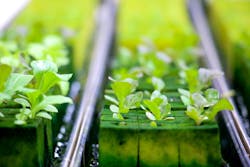Today’s blog notes a bright spot amongst many past reports of reduced government-backed financial support in research & development (R&D) and education programs that aim to improve living conditions, reduce environmental impact, and manage the growing population’s resources via technology.
Cornell University has reported that the US Department of Agriculture (USDA), through its National Institute of Food and Agriculture (NIFA), has endowed the university’s College of Agriculture and Life Sciences’ School of Integrative Plant Science with a $496,000 grant. The federal funding will be used to develop new controlled environment agriculture (CEA) training programs for a skilled workforce that is sorely needed.
Cornell’s associate professor of horticulture Neil Mattson, well-known to us as the keynote speaker at our 2019 HortiCann Light + Tech conference, will collaborate with Cornell Small Farms program director Anu Rangarajan, Ohio State University’s Agricultural Technical Institute, and SUNY Broome Community College to create a technical training certificate in CEA production. The partners also expect to develop a two-year associate’s degree program for students at these institutions and other community colleges to provide solid education in CEA.
Mattson said in the Cornell Chronicle, “Growers consistently state that finding well-trained personnel to operate their facilities is among the largest barriers to expansion.”
Why do we need this educational support? The global population is growing, and supply needs to ramp up to deliver healthy foods to all economic strata. Many food crops are currently unavailable close to home for many, which places a burden on transportation and increases carbon footprint, as well as impacting shelf life. CEA can bring many food-growing resources closer to consumers, especially in urban areas or regions that would prove inhospitable to sensitive crops in a traditional farming operation.
CEA gives growers the means to apply physical systems of growth media, environmental controls, horticultural lighting, and water supply systems along with evidence-backed research in pest management, food safety processes, light customization, and more to produce food sources in a manner designed to balance economic viability, food demand, and sustainability.
Technologies available to modern CEA growers would naturally require a more advanced skillset. Indeed, said Rangarajan, “Our efforts have laid the groundwork for what I hope will be a dynamic training program that will build the workforce and elevate the industry as a whole.”
It’s an exciting time in the horticultural and agricultural space, and learning opportunities abound. Bookmark our HortiCann Light + Tech conference homepage for updates on our upcoming October program, now virtual for 2020. Moving beyond horticultural lighting fundamentals, the program will also delve into agribusiness and the return on investment in advanced systems and controls, AgTech systems integration, and topics related to legalized cannabis growing operations.
For up-to-the-minute LED and SSL updates, why not follow us on Twitter? You’ll find curated content and commentary, as well as information on industry events, webcasts, and surveys on our LinkedIn Company Page and our Facebook page.

Carrie Meadows | Editor-in-Chief, LEDs Magazine
Carrie Meadows has more than 20 years of experience in the publishing and media industry. She worked with the PennWell Technology Group for more than 17 years, having been part of the editorial staff at Solid State Technology, Microlithography World, Lightwave, Portable Design, CleanRooms, Laser Focus World, and Vision Systems Design before the group was acquired by current parent company Endeavor Business Media.
Meadows has received finalist recognition for LEDs Magazine in the FOLIO Eddie Awards, and has volunteered as a judge on several B2B editorial awards committees. She received a BA in English literature from Saint Anselm College, and earned thesis honors in the college's Geisel Library. Without the patience to sit down and write a book of her own, she has gladly undertaken the role of editor for the writings of friends and family.
Meadows enjoys living in the beautiful but sometimes unpredictable four seasons of the New England region, volunteering with an animal shelter, reading (of course), and walking with friends and extended "dog family" in her spare time.





